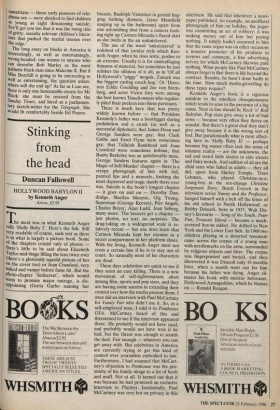Stinking •
from the head
Duncan Fallowell
HOLLYWOOD BABYLON II by Kenneth Anger Arrow, £5.95
The meat was in what Kenneth Anger Calls 'Holly Baby I'. Here's the fish. Still Very readable of course, such text as there Is in what is largely a picture book. Some Of the chapters consist only of photos there's little to be said about Elizabeth Taylor mid-binge filling the lens twice over (there's a gloriously squalid picture of her on "the cover too) or Joan Crawford, very naked and vampy before fame hit. But the Photo-chapter 'Indiscreet', which would seem to promise major outrage, is dis- appointing (Greta Garbo sunning her breasts, Rudolph Valentino in genital hug- ging bathing drawers, Jayne Mansfield soaping up in the bathroom) apart from one astonishing shot from a camera look- ing right up Carmen Miranda's flared skirt as she twirls in the air unknickered.
The use of the word 'unknickered' is redolent of that jocular style which Ken- neth Anger, when he does write, pushes to an extreme. Usually it is for camouflaging thinness of material, but sometimes he just relishes the silliness of it all, as in 'Of all Hollywood's "piggy" moguls, Zanuck was the biggest casting couch hog.' Or 'Direc- tors Eddie Goulding and Joe von Stern- berg, and actor Victor Jory were among the best known Tinseltowners who regular- ly piled their peckers into these partouzes.'
There is much here that was pretty widely known before — that President Kennedy's father was a bootlegger during prohibition and a crook (as well as a successful diplomat); that James Dean and George Sanders were gay; that Clark Gable and Errol Flynn were sometimes gay; that Tallulah Bankhead and Joan Crawford were sometimes lesbian; that Busby Berkeley was an unbelievable mess. George Sanders features again in 'The Magic of Self-Murder' chapter — there is a creepy photograph of him with full, painted lips and a monocle, looking the most depraved and tragic dandy there ever was. Suicide is the book's longest chapter — it goes on and on — Dorothy Dan- dridge, Marilyn Monroe, Gig Young, Superman (George Reeves), Pier Angeli, Charles Boyer, Alan Ladd, Jean Seberg, many more. The boozers get a chapter just photos, no text, no surprises. The drug-taking on a widespread scale is re- latively recent — but one does learn that Carmen Miranda kept her cocaine in a secret compartment in her platform shoes. With the living, Kenneth Anger must not cross a certain line if he is to stay out of court. So naturally most of his characters are dead.
These days celebrities are quick to sue if they scent an easy killing. There is a new movement of self-righteousness afoot among film, sports and pop stars, and they are having some success in extending their control over how the media present them. I once did an interview with Paul McCartney for Vanity Fair who didn't use it. So, as a self-employed man, I sold it to Penthouse USA. McCartney heard of this and threatened to sue if the interview appeared there. He probably would not have sued, and probably would not have won if he had, but the threat was enough to scotch the deal. Fair enough — whatever you can get away with. But celebrities in America are currently trying to get this kind of control over journalists embodied in law. Furthermore, I had assumed that McCart- ney's objection to Penthouse was the pro- ximity of his family image to a lot of boob and muff. Not at all. It turned out that it was because he had promised an exclusive interview to Playboy. Incidentally, Paul McCartney was very hot on privacy in this interview. He said that whenever a news- paper published, for example, an unofficial photograph of him on holiday, the paper was committing an act of robbery: it was making money out of him but paying nothing. It simply hadn't occurred to him that the same organ was on other occasions a massive promoter of his products in reviews and comment, a free advertising service for which McCartney likewise paid nothing. What people like Paul McCartney always forget is that there is life beyond the contract. Besides, he hasn't done badly in his time. How much media-grovelling do these types require?
Kenneth Anger's book is a vigorous antidote to the mindless obsequiousness which tends to arise in the presence of a big name. Next in line should be Rock 'n' Roll Babylon. Pop stars give away a lot of bad news — because very often they thrive on scandal. But there's a great deal they don't give away because it is the wrong sort of bad. But paradoxically what is most affect- ing here in 'Holly Baby II' — perhaps because big names often lack the sense of intimate reality — are the unknowns, the sad and weird little stories in side streets and flaky motels. And saddest of all are the child stars who failed as adults — they all did, apart from Shirley Temple. Trent Lehman, who played Christine-as-a- young-boy in the sex-change Christine Jorgensen Story; Butch Everett in the television series Nanny and the Professor, hanged himself with a belt off the fence of his old school in North Hollywood; or Bobby Driscoll, born in 1937, Walt Dis- ney's favourite — Song of the South, Peter Pan, Treasure Island — became a much- arrested heroin addict. He drifted to New York and the Lower East Side. In 1968 two children playing in a deserted tenement came across the corpse of a young man with needlemarks on the arms, surrounded by religious objects and litter. The corpse was fingerprinted and buried, and they discovered it was Driscoll only 19 months later, when a search went out for him because his father was dying. Anger cli- maxes his book with nuclear holocaust, Hollywood Armageddon, which he blames on — Ronald Reagan.














































 Previous page
Previous page